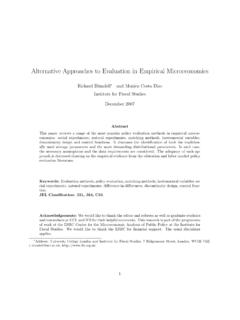Transcription of Early Childhood Education - AQENY
1 Alliance for Quality Education Early Childhood Education is one of the most important phases in a child s life. There is an enormous amount of research proving that when children attend high quality Early Childhood programs, they have better chances of succeeding in school, going to college and getting a higher paying job. Quality Early Childhood programs provide children with the tools they need to learn social, behavioral, and learning skills at their own pace, in terms they can understand.
2 It is essential that children have access and receive Education that is appropriate for their age. At each developmental stage children learn differently. For instance, toddlers (18 months to 3 years) need to learn to trust the adults around them and become autonomous. For preschoolers and kindergarteners, who are at the stage of making choices and taking initiative, it is important to engage in activities in which they learn to think critically, communicate about their choices both verbally and in writing (through drawing, writing their names, copying words, etc). When children have attended quality Early Childhood programs, including pre-kindergarten, they enter Kindergarten with the skills they need to have high academic achievement throughout their school career.
3 Benefits to children who attend quality Early Childhood Programs: A large number of studies have clearly shown the benefits of quality Early Childhood Education : 1. Increases high school graduation rates: Chicago children who attended an Early Childhood Education program were 29% more likely to graduate from high school than their peers who did not attend. 2. Helps children do better on standardized tests: Michigan fourth graders who had attended Early Childhood Education programs passed the state's literacy and math assessment tests at higher rates than their peers who did not attend. 3. Reduces grade repetition: Maryland fifth graders who attended an Early Childhood Education program were 44% less likely to have repeated a grade than their peers who did not attend.
4 4. Reduces the number of children placed in special Education : Among Chicago children, those who attended an Early Childhood Education program were 41% likely to require special Education services than their peers who did not attend. 5. Reduces crime and delinquency: Chicago children who did not attend Early Childhood Education programs were 70% more likely to be arrested for violent crime by age 18 than their peers who had attended. 6. Lowers rates of teen pregnancy: North Carolina children who attended Early Childhood programs were less likely to become teen parents than their peers who did not attend (26% vs. 45%). 7.
5 Leads to greater employment and higher wage as adults: Forty-year old adults in Michigan who attended Early Childhood Education programs as children were more likely to be employed and had a 33% higher average income than their peers who did not attend. 8. Contributes to more stable families: Forty-year old adults in Michigan who attended Early Childhood Education programs as children were more likely to report that they were getting along very well with their families than their peers who did not attend (75% vs. 64%). Early Childhood Education Learning starts in infancy, long before formal Education begins, and continues throughout life.
6 Recent research in psychology and cognition demonstrates how vitally important the Early preschool years are for skill formation. Early learning begets later learning and Early success breeds later success, just as Early failure breeds later failure (Heckman, 2000, ) Alliance for Quality Education 9. Improves classroom efficiency: Children who attended Early Childhood Education programs as Head Start centers had more advanced skills in areas such as following directions, problem-solving, and joining in activities, all of which allow teachers to spend more time working directly with children and less on classroom management.
7 10. Yields incredible savings. For every $1 invested in pre-k saves tax payers up to $7: savings are found in reduction of remedial and special Education , welfare, and criminal justice services. Early Childhood Education is a student s foundation for success in school and college The New York State Board of Regents recently adopted Prekindergarten Learning Standards. These standards are part of the effort to align standards from PreK to 12 Grade. The PreK Learning Standards will strengthen instruction in PreK classrooms in all settings, as well as help administrators and educators align PreK standards with the K-12 system1. This way, children will learn through developmentally appropriate practices, acquiring the skills necessary to enter the K-12 system and continue building on those skills.
8 Having aligned standards throughout the Education system, inclusive of PreK and college, a step that NYS has taken, is a step in the right direction to ensure that all children have access to the quality of Education they deserve. Quality Stars New York: the new quality rating and improvement system being tested New York is currently testing a new quality rating and improvement system which will allow parents, teachers and programs to know where each program is in terms of reaching all the quality standards for Early Childhood Education (see attached document for more information). This rating system is meant to rate PROGRAMS not children.
9 This system is designed to provide Early Childhood Education programs with a path to excellence; so that every child that attends has the resources and tools necessary to learn the fundamental skills she need to succeed in school. 1 New York State Prekindergarten Learning Standards, 2011 Benefits of QUALITY starsNY: Provides programs with a roadmap and access to support and resources to insure improvement. Recognizes programs for their strengths while helping them improve where needed. Provides financial incentives and supports to individual professionals as well as programs.
10 Integral to a quality rating and improvement system is a comprehensive and coordinated professional development system which: benefits professionals in all settings, responds to the needs of professionals at all levels, from entry-level assistance to multi-site administrator. QualitystarsNY: Ready for College Ready for Kindergarten (Winning Beginning NY and Public Policy and Education Fund) Alliance for Quality Education References: Belfield, Clive R. (2004) Early Education : How Important Are the Cost Savings to the School System Research Briefing.




